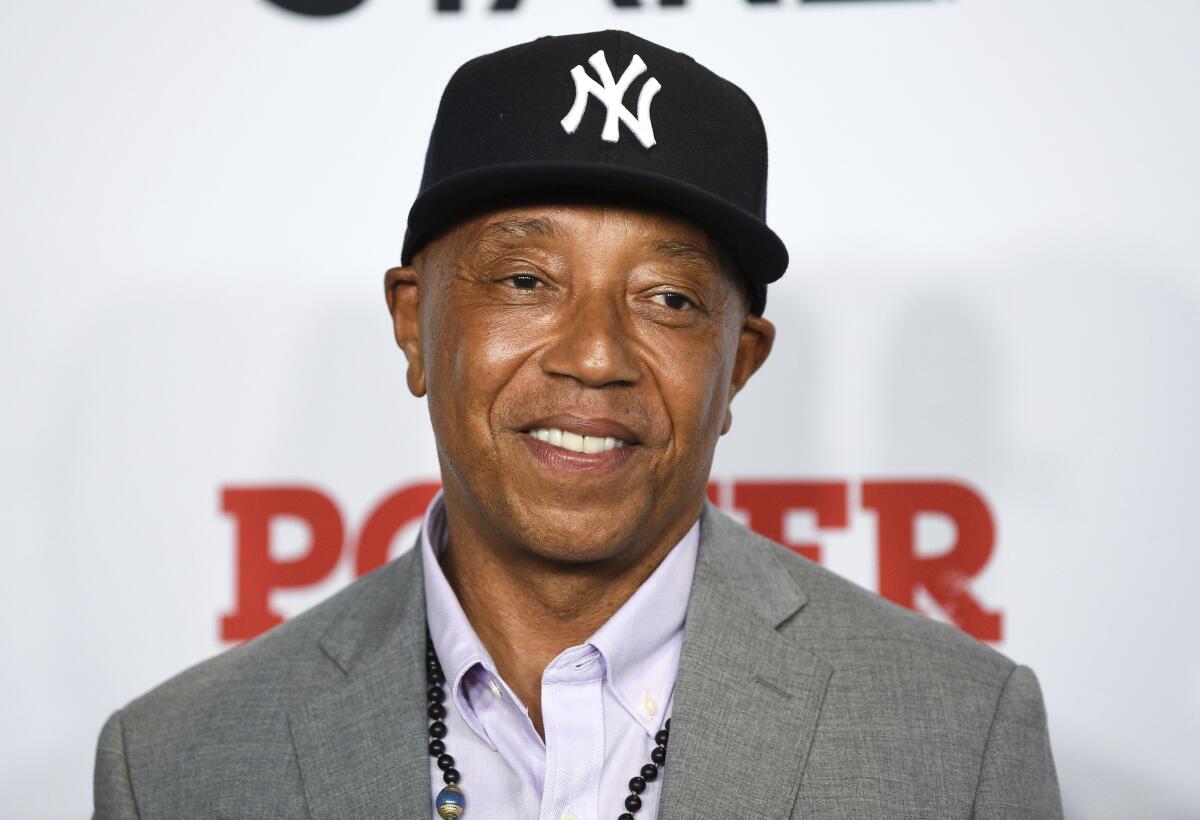Russell Simmons sued for defamation by former Def Jam executive who accused him of sexual assault

Hip-hop impresario and entrepreneur Russell Simmons is being sued for defamation by Drew Dixon, a former Def Jam Recordings executive who also has accused Simmons of sexual assault and harassment during her time at the label in the 1990s.
The complaint, filed Thursday in New York Supreme Court, claims that last December Simmons “subjected Ms. Dixon to public ridicule, contempt, and disgrace by, among other things, calling Ms. Dixon a liar in published statements with the malicious intent of discrediting and further damaging Ms. Dixon worldwide.” The suit further alleges that Simmons has “continued this pattern of defamation” through January of this year.
A representative for Simmons could not immediately be reached for comment. Simmons has previously denied Dixon’s and other accusers’ allegations.
It was the second lawsuit filed against Simmons this week.
On Tuesday, another woman, identified as a Jane Doe, sued Russell for rape in a separate complaint filed in U.S. District Court for the Southern District of New York. The accuser, who said she worked as a senior music executive at Def Jam, alleged that she was “sexually harassed, assaulted, sexually battered, and raped” by Simmons when she worked at the label during the 1990s.
“I have never engaged in nonconsensual sex. I would not, did not, and never will,” said Simmons in a statement to The Times in regards to the Jane Doe suit. A representative for Simmons said that the music mogul “has voluntarily taken numerous lie detector tests all of which support his statement.”
In 1994, Dixon, then 23, began working at Def Jam as director of A&R (artists and repertoire), in what she called “her dream job,” according to the suit.
At the label, Dixon garnered immediate success, conceiving and spearheading chart-topping songs such as “I’ll Be There for You — You’re All I Need” by Method Man, featuring Mary J. Blige.
But Dixon claims she was subjected to “persistent, nightmarish sexual harassment that culminated in a violent sexual assault by the man she once admired,” Simmons, her boss and co-founder of Def Jam.
Simmons “fostered a chaotic workplace environment where he thrived on the sexual exploitation of individuals who were dependent on access to his opinion and approval in order to perform their jobs and succeed in their careers,” states the complaint.
According to her suit, Dixon claims Simmons’ abuse began as soon as she started working at the label.
Dixon alleges that despite constantly rebuffing his alleged advances, Simmons “routinely attempted to grope her and kiss her.” Once he “forcibly pushed” her into a broom closet at a restaurant where he tried to kiss her, the suit says. Dixon alleges that Simmons “regularly exposed his erect penis” and “talked about how much she turned him on.”
Then she alleges that in 1995, Simmons raped her in his Manhattan apartment after she ran into him on the street. Dixon told him she was going to an ATM and he “ordered her into his car.” Once they arrived at his apartment, she said he asked her to come upstairs to listen to a new CD.
However, once inside his apartment, when Dixon opened the CD tray, she found it was empty. “Moments later Mr. Simmons grabbed Ms. Dixon from behind. He was naked except for a condom. He proceeded to pin her down on the bed and violently rape her,” according to the suit.
After the alleged assault, Dixon resigned from Def Jam.
According to Dixon’s complaint, Simmons has engaged in a “concerted and malicious campaign to discredit” her “and to so damage her reputation that Ms. Dixon’s factual reporting of what he did to her would not be credited.”
Dixon cites several statements Simmons made in a podcast interview with journalist Graham Bensinger that she claims reference her own public comments concerning her abuse allegations.
For instance, during the podcast, Simmons said, “Yeah, [rape is] a serious word, but I think they’ve changed the meaning,” according to the complaint.
“Ms. Dixon has taken enough abuse,” said Dixon’s lawyer Sigrid McCawley in a statement. “Not only was she violently raped by Russell Simmons — profoundly disrupting her personal and professional life — but after she tried to move forward and heal, he then further abused her by publicly proclaiming that she lied about the rape in search of ‘fame.’ Mr. Simmons has used his public platform to re-traumatize and terrorize Ms. Dixon, and the time has now come to hold him accountable for his defamatory statements and to end this cycle of abuse.”
Last November Dixon filed suit against music executive Antonio “L.A.” Reid for sexual assault and harassment, under the Adult Survivors Act.
After Dixon left Def Jam, she went to Arista, where she was vice president of A&R. Reid ran Arista and Epic Records.
In the suit, filed in federal district court in Manhattan, Dixon alleges that Reid “sexually harassed Ms. Dixon and refused to allow her to succeed unless she acquiesced to his demand to be alone and in close proximity to her, where he would create the opportunity to sexually assault her on two separate occasions.”
At the time of the filing, a representative for Reid did not respond to requests for comment.
Dixon first came forward with her abuse allegations against Simmons and Reid in a 2017 New York Times article. She was one of three women who accused Simmons of rape, claiming that he engaged in a pattern of sexual assault and harassment that derailed their careers and damaged their self-confidence.
Three years later, Dixon and other women of color were featured in the documentary “On the Record,” which further detailed abuse claims against Simmons and others in the record industry.
The film premiered at the Sundance Film Festival under a cloud of controversy.
Weeks before Sundance, Oprah Winfrey, one of “On the Record’s” producers, pulled her support from the film and removed her executive producer title from the project. Winfrey asserted that her decision was based on discussions with several individuals who found the film problematic and raised questions about Dixon’s account.
The move quashed the documentary’s distribution deal with Apple TV+. It is currently streaming on HBO Max.
Staff writers August Brown and Alexandra Del Rosario contributed to this report.
More to Read
Inside the business of entertainment
The Wide Shot brings you news, analysis and insights on everything from streaming wars to production — and what it all means for the future.
You may occasionally receive promotional content from the Los Angeles Times.





